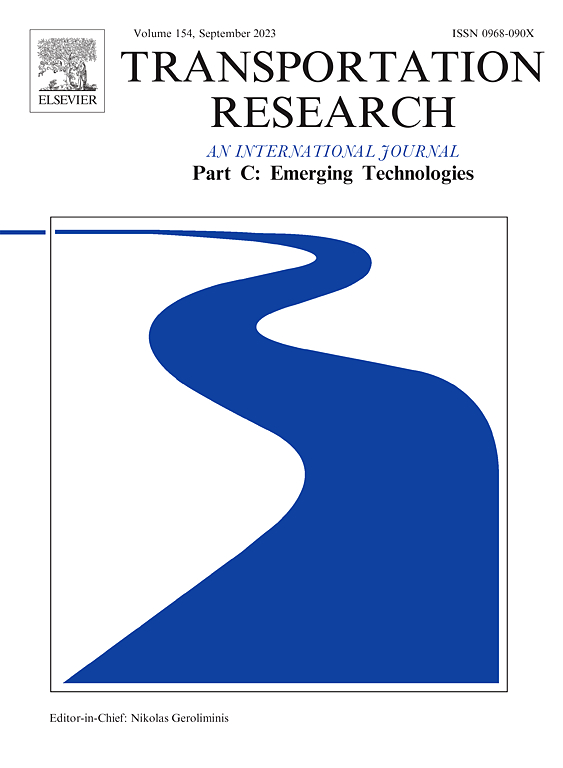Analytical Eco-Driving for electric and conventional vehicles: A unified computational approach
IF 7.6
1区 工程技术
Q1 TRANSPORTATION SCIENCE & TECHNOLOGY
Transportation Research Part C-Emerging Technologies
Pub Date : 2024-10-17
DOI:10.1016/j.trc.2024.104879
引用次数: 0
Abstract
This paper presents a methodology to generate energy efficient speed profiles for electric and conventional vehicles using analytical Eco-Driving solutions. In recent years, the energy savings that can be achieved by adjusting the speed of road vehicles have motivated the development of ecological driving strategies. From this perspective, different Eco-Driving strategies are formulated as free final time Optimal Control Problems aiming at minimizing the energy consumed during a trip subject to input and speed constraints. These Eco-Driving problems are solved using Pontryagin’s Minimum Principle to derive the closed-form expressions composing the (un-)constrained solutions. Moreover, the performance of the proposed strategies is compared against two reference cycles and the global optimal savings given by a Dynamic Programming strategy. The simulation results show that up to 26.43% and 32.18% of energy savings can be obtained for electrified and conventional vehicles, respectively, while keeping the computation time in a millisecond range.
电动汽车和传统汽车的生态驾驶分析:统一的计算方法
本文介绍了一种利用生态驾驶分析解决方案生成电动汽车和传统汽车节能速度曲线的方法。近年来,通过调整道路车辆的速度可以实现节能,这推动了生态驾驶战略的发展。从这一角度出发,不同的生态驾驶策略被表述为自由最终时间最优控制问题,目的是在输入和速度限制条件下,最大限度地降低行驶过程中的能耗。这些生态驾驶问题利用庞特里亚金最小原则求解,从而得出构成(无)约束解的闭式表达式。此外,还将所提策略的性能与两个参考周期和动态编程策略给出的全局最优节约进行了比较。模拟结果表明,电气化车辆和传统车辆的节能率分别可达 26.43% 和 32.18%,同时计算时间保持在毫秒级范围内。
本文章由计算机程序翻译,如有差异,请以英文原文为准。
求助全文
约1分钟内获得全文
求助全文
来源期刊
CiteScore
15.80
自引率
12.00%
发文量
332
审稿时长
64 days
期刊介绍:
Transportation Research: Part C (TR_C) is dedicated to showcasing high-quality, scholarly research that delves into the development, applications, and implications of transportation systems and emerging technologies. Our focus lies not solely on individual technologies, but rather on their broader implications for the planning, design, operation, control, maintenance, and rehabilitation of transportation systems, services, and components. In essence, the intellectual core of the journal revolves around the transportation aspect rather than the technology itself. We actively encourage the integration of quantitative methods from diverse fields such as operations research, control systems, complex networks, computer science, and artificial intelligence. Join us in exploring the intersection of transportation systems and emerging technologies to drive innovation and progress in the field.

 求助内容:
求助内容: 应助结果提醒方式:
应助结果提醒方式:


